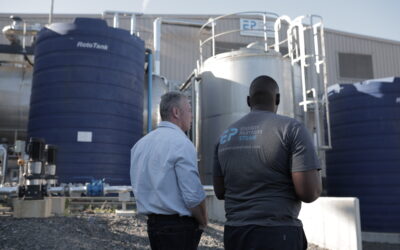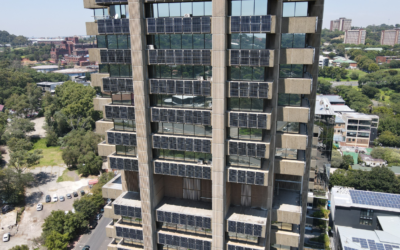Globally, natural refrigerants are fast becoming the most viable substitute to chlorofluorocarbons (CFCs) and hydrochlorofluorocarbons (HCFCs) as the world moves towards more environmentally friendly and sustainable solutions. There are many natural refrigerants available to the market today, but the three best-known options at this stage, especially for industrial and retail refrigeration systems, are ammonia (R717/R723), CO2 (R744) and Propane (R290).
This is according to Dawie Kriel, Head of EP Refrigeration – a division of Energy Partners and part of the PSG group of companies – who says that ammonia stands out as the refrigerant with the most potential to replace synthetics completely in the industrial applications in the years to come.
“CFCs and HCFCs are rapidly increasing in cost and decreasing in availability as governments around the world are working towards phasing out these refrigerants. Ammonia has no ozone depletion potential, a GWP rating of zero, great thermodynamic properties resulting in high energy efficiency, and is the best refrigerant for larger systems. It is also the natural refrigerant system with the most technical support in South Africa, since ammonia-based systems have been utilised locally, in some form or another since the early 1970’s. The life cycle cost (which includes capital cost, energy cost and maintenance cost) of ammonia systems is also up to 20% lower than traditional synthetic refrigerant systems.”
The advantages of this for the South African market are clear, says Kriel. “What we need now, is for the companies and individuals that already have experience in this technology, to start incorporating the knowledge gained in overseas markets, and produce solutions that fit the unique requirements of the South African market.”
The flaws of R717
At the same time, Kriel points out that ammonia does pose a couple of challenges at present. “Firstly, ammonia is toxic and flammable in high concentrations, meaning that any refrigerant leak in the system carries a potential safety hazard. This is one of the reasons why R717 systems are mostly limited to industrial applications, and why the commercial market still tends to shy away from this solution.
“Secondly, while ammonia is well suited to mid-temperature cooling (5°C to -30°C), it under-performs in very low temperature applications (-35°C to -50°C) where CO2 is still a better performer,” he adds.
Another negative aspect of ammonia, especially in the South African market, is the fact that these systems traditionally rely on evaporative condensing. “Naturally, this is a real problem in the South African context, where reducing water usage has become one of the biggest priorities for businesses, next to electrical efficiency.”
Kriel points out that together with the higher initial capital cost, these drawbacks continue to play a role in limiting the market for ammonia-based systems to some degree. However, he also says that the challenges listed above are manageable, and great strides have already been made in the industry to realise the full potential of ammonia-based solutions.
Unlocking the potential of R717
Globally, the drive to further develop the capabilities of R717 systems is gaining significant momentum, and Kriel notes that the safety concerns surrounding ammonia gas is one of the top areas of focus. “The toxicity and volatility of ammonia is the main reason why it is mainly utilised in operations that are not located near the general public. In response to this, a lot of work has been done to reduce the amount of R717 that is actually required to achieve the desired level of refrigeration for each application.”
He adds that the use of direct expansion systems with very accurate vapour quality control, allows one to reduce the ammonia charge (and vessel size) without losing energy efficiency.
The development of hybrid and air-cooled condensing systems for ammonia refrigerants have also helped to address the issue of high water use. R723, a blend of ammonia and dimethyl ether, allows the use of air-cooled condensers in higher ambient climates.
From a cost point of view, some of the world’s most prominent companies are also endeavouring to reduce the capital cost of ammonia-based systems. “There has been some progress in developing systems that incorporate a secondary refrigerant such as CO2 alongside ammonia as a primary driver, to achieve lower temperatures while still containing the initial cost of the system. Advancement has also been made in introducing smaller compressors into the ammonia market, effectively cutting down on the footprint of the equipment, as well as the amount of refrigerant required. This opens up more possibilities to start utilising ammonia, even in commercial applications.”
Changing perceptions
One final obstacle that R717 systems face in South Africa today is that of perception, as ammonia-based refrigeration systems are still considered more costly than many other solutions.
Kriel admits that the cost of installing ammonia systems is still between 10% and 20% higher than traditional CFC and HCFC units. “We have unfortunately seen that some companies are discouraged by this. However, if viewed from a life-cycle perspective, it becomes clear that the capital outlay is only a small part of the total cost of any system. The cost of maintaining ammonia-driven systems is objectively lower than with synthetics, and they also have an effective life cycle of around 25 years, as opposed to the 10 to 15 year life span of commercial systems used for CO2, propane and synthetic refrigerants.”
The energy efficiency also plays a massive role, as electricity use makes up a minimum of 60% of the life cycle cost of any given system. Modern ammonia-based systems require around between 5% and 15% less energy to operate compared to traditional synthetic and CO2 transcritical systems, which adds up to significant savings over 20 years.
In addition, when making the comparison between ammonia and the other promising natural refrigerant, CO2, Kriel again points to the availability of expertise in South Africa. “Certainly, CO2 systems are competitive with ammonia in terms of price, but the cost of maintenance over the life span of the system will most likely be higher, since there is a comparatively smaller skills pool than in the case of ammonia. This is not to say that CO2 has no place in the South African market, but it is certainly a less viable solution for large-scale operations (550KW applications and higher).”
With this in mind, Kriel states that service providers in South Africa should take the time to bring the message of long-term cost-effective operation across to potential clients. “As part of driving the notion that ammonia-based refrigerants are the best solution for the South African market, our industry needs to start pushing the message that the long term benefits of these systems far outweigh any upfront capital costs – which only represent around 15% of the cost of the system throughout its total life cycle.”
Naturally, EP Refrigeration also has extensive experience in R717-based systems. “All of the systems that we currently design and supply under EP Refrigeration’s Multistage brand are ammonia-based solutions. As a company, we have built up a huge base of expertise around this technology specifically, and we do quite a significant number of new installations each year.”
According to Kriel, the potential for ammonia as a refrigerant is so much greater than its current applications in South Africa, and this is something of which the market should become much more aware. “The technology has evolved to such an extent, that we believe R717-based systems should be the first option to be considered in virtually any industrial application and certainly a good contender in larger commercial applications. If the industry in South Africa continues to drive better innovation, there could also be no limit to what this versatile refrigerant can achieve,” he concludes.




